|
|
|
Sort Order |
|
|
|
Items / Page
|
|
|
|
|
|
|
| Srl | Item |
| 1 |
ID:
157729
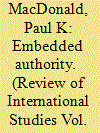

|
|
|
|
|
| Summary/Abstract |
Relations of sovereign inequality permeate international politics, and a growing body of literature grapples with the question of how states establish and sustain hierarchy amidst anarchy. I argue that existing literature on hierarchy, for all its diverse insights, misses what makes hierarchy unique in world politics. Hierarchy is not simply the presence of inequality or stratification among actors, but rather an authority relationship in which a dominant actor exercises some modicum of control over a subordinate one. This authority relationship, moreover, is dramatically different than ones found in domestic hierarchies. It is shaped less by written laws or formal procedures, than by subtle forms of manipulation and the development of informal practices. For this reason, hierarchy cannot simply be reduced the to the dynamics of anarchy, and must be viewed as a relational phenomenon. Ties between actors create positions that permit dominant actors to appropriate and orchestrate the sharing of authority with subordinate intermediaries. This article develops this relational network approach, highlighting how concepts such as access, brokerage, and yoking can illuminate the processes by which authority is enlisted and appropriated in world politics.
|
|
|
|
|
|
|
|
|
|
|
|
|
|
|
|
| 2 |
ID:
103652


|
|
|
|
|
| Publication |
2011.
|
| Summary/Abstract |
There is broad scholarly consensus that the relative power of the United States is declining and that this decline will have negative consequences for international politics. This pessimism is justified by the belief that great powers have few options to deal with acute relative decline. Retrenchment is seen as a hazardous policy that demoralizes allies and encourages external predation. Faced with shrinking means, great powers are thought to have few options to stave off decline short of preventive war. Contrary to the conventional wisdom, however, retrenchment is not a relatively rare and ineffective policy instrument. A comparison of eighteen cases of acute relative decline since 1870 demonstrates that great powers frequently engage in retrenchment and that retrenchment is often effective. In addition, we find that prevailing explanations overstate the importance of democracies, bureaucracies, and interest groups in inhibiting retrenchment. In fact, the rate of decline can account for both the extent and form of retrenchment, even over short periods. These arguments have important implications for power transition theories and the rise of China.
|
|
|
|
|
|
|
|
|
|
|
|
|
|
|
|
| 3 |
ID:
087612


|
|
|
|
|
| Publication |
2009.
|
| Summary/Abstract |
The idea that the United States is an empire or should adopt imperial strategies has been widely criticized. One of the most persuasive sets of arguments against imperial enthusiasts is that empire is an obsolete and outdated strategy. Both systemic- and domestic-level changes are said to prevent the United States from successfully implementing an imperial strategy. I maintain that the importance of these barriers-whether technological, economic, or ideational-are greatly overstated. In contrast, I point to a number of developments, such as the rise of nontraditional security threats, the revolution in military affairs, and changing norms of humanitarian intervention, that will encourage greater American overseas adventurism.
|
|
|
|
|
|
|
|
|
|
|
|
|
|
|
|
| 4 |
ID:
183153


|
|
|
|
|
| Summary/Abstract |
Contemporary power politics often takes place in liberal fora, yet scholars have not paid sustained attention to the origins and characteristics of this mode of statecraft. To trace the development of these repertoires, the negotiation practices of the 1899 and 1907 Hague conferences represent a critical transition from realist practices of the Concert system to twentieth-century liberal internationalism. At The Hague, states experimented with using parliamentary procedure: they introduced motions, held votes, signed and ratified agreements. The Hague conferences were also an occasion where states grappled with questions of institutional design. More broadly, the conferences were a moment when states appealed to concepts of public opinion, international society, and “civilisation” to legitimise change. The methods that diplomats developed for managing tensions within and amongst these repertoires remain a familiar feature of liberal statecraft until the present day.
|
|
|
|
|
|
|
|
|
|
|
|
|
|
|
|
| 5 |
ID:
087603
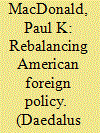

|
|
|
|
|
| Publication |
2009.
|
| Summary/Abstract |
The United States faces unprecedented
foreign policy and national security
challenges.1 Conflicts in Iraq and Afghanistan,
the global war on terrorism,
the proliferation of nuclear weapons,
the increasing assertiveness of Russia,
the growth of Chinese military power,
global climate change, not to mention
the spread of poverty, infectious diseases,
and ethnic and religious strife
around the world: the challenges aren't
limited; the resources to meet them are.
The high operational tempo of the wars
in Iraq and Afghanistan has stretched
the military to the breaking point. The
ongoing ½nancial crisis and economic
recession will severely limit the ability
of the federal government to sustain
or increase expenditures for defense
and foreign aid.
|
|
|
|
|
|
|
|
|
|
|
|
|
|
|
|
| 6 |
ID:
167203
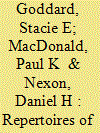

|
|
|
|
|
| Summary/Abstract |
Issues involving ‘statecraft’ lie at the heart of most major debates about world politics, yet scholars do not go far enough in analyzing how the processes of statecraft themselves can reshape the international system. We draw on the growing relational-processual literature in international relations theory to explore how different modes of statecraft can help create and refashion the structure of world politics. In particular, we argue that scholars should reconceive statecraft in terms of repertoires. An emphasis on repertoires sheds light on a number of issues, including how statecraft influences patterns of technological innovation, the construction of institutional and normative orders, and the pathways through which states mobilize power in world politics.
|
|
|
|
|
|
|
|
|
|
|
|
|
|
|
|
| 7 |
ID:
120163
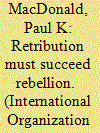

|
|
|
|
|
| Publication |
2013.
|
| Summary/Abstract |
What can explain the decline in incumbent victory in counterinsurgency wars? Political scientists offer a variety of explanations for these trends. Some focus on the structure and doctrine of counterinsurgent forces, while others emphasize the lethality and motivation of insurgent adversaries. I challenge these explanations. Declines in incumbent victory in counterinsurgency wars are not driven by fundamental shifts in the character of these conflicts, but in the political context in which they take place. Nineteenth-century colonial incumbents enjoyed a variety of political advantages-including strong political will, a permissive international environment, access to local collaborators, and flexibility to pick their battles-which granted them the time and resources necessary to meet insurgent challenges. In contrast, twentieth-century colonial incumbents struggled in the face of apathetic publics, hostile superpowers, vanishing collaborators, and constrained options. The decline in incumbent victory in counterinsurgency warfare, therefore, stems not from problems in force structure or strategy, but in political shifts in the profitability and legitimacy of colonial forms of governance.
|
|
|
|
|
|
|
|
|
|
|
|
|
|
|
|
| 8 |
ID:
086442


|
|
|
|
|
| Publication |
2009.
|
| Summary/Abstract |
A growing number of scholars, commentators, and pundits describe the contemporary US as an empire. This article argues that these authors have not paid sufficient attention to the historiography of empire and imperialism. Indeed, the historiography of the British and American empires offers important lessons for current debates including what is the appropriate definition of the American empire, what are the social and political foundations of the American Empire, and what are the consequences of the American Empire for the US and the wider world.
|
|
|
|
|
|
|
|
|
|
|
|
|
|
|
|
| 9 |
ID:
107595
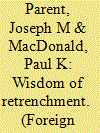

|
|
|
|
|
| Publication |
2011.
|
| Summary/Abstract |
The United States can no longer afford a world-spanning foreign policy. Retrenchment -- cutting military spending, redefining foreign priorities, and shifting more of the defense burden to allies -- is the only sensible course. Luckily, that does not have to spell instability abroad. History shows that pausing to recharge national batteries can renew a dominant power's international legitimacy.
|
|
|
|
|
|
|
|
|
|
|
|
|
|
|
|
|
|
|
|
|